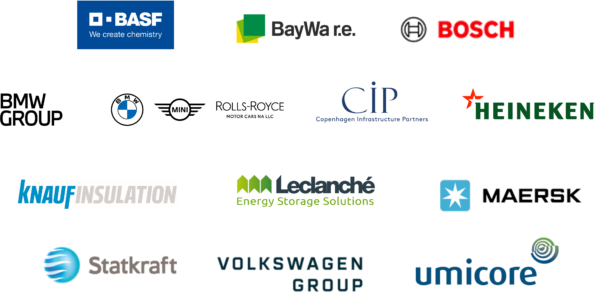Joint letter
Industries investing in Europe call: don’t undermine the business case to invest in renewable energy

Brussels, 12 December 2024
For the attention of:
European Union Member States Permanent Representations,
European Commission President Von Der Leyen,
European Commission Executive Vice-President Ribera,
European Commissioner Hoekstra, European Commissioner Jørgensen, European Commissioner Roswall, European Commissioner Séjourné,
Director General Florika Fink-Hooijer, Director General Ditte Juul Jørgensen, Director General Kerstin Jorna
As industries investing in Europe’s industrial base and energy transition, we strongly urge a reconsideration of the proposal to rely solely on average grid mixes for the electricity modelling for the carbon footprint calculation in the EV batteries Delegated Act. The Act must recognise energy market tools in order to reduce the carbon-intensity of battery production.
The draft methodology relies solely on average grid mixes, ignoring significant investments companies have made, and want to make, via renewable power purchase agreements (PPAs) and energy attribute certificates, known as guarantees of origin (GOs) in Europe, which are indispensable financing tools for renewable energy.
This issue impacts key EU priorities: industrial competitiveness, the energy transition, and decarbonisation of our economy.
Carbon footprint rules should incentivise energy decarbonisation, essential for achieving net-zero emissions from European industry. The Delegated Act must set the right precedent for future carbon footprint methodologies, ensuring that truly sustainable products are sold in the EU as well as supporting the PPA market.
If PPAs are not admissible, we undermine the business case to invest in renewables and render the energy transition the sole responsibility of governments. Instead, governments should incentivise private investments in renewables.
In addition to allowing PPAs, the Act should recognise residual mixes in the electricity hierarchy, to ensure that clean energy is not being double counted. Otherwise, we undermine the energy system.
Some have suggested that using the average grid mix would improve EU competitiveness relative to third countries. Conversely, some EU countries have grids with a higher carbon-intensity than other regions of the world, e.g. China today – and China is building renewables at pace.
National grid carbon intensity calculations would penalise European companies and not give them the chance to access renewables via PPAs. Better to have strong safeguards in place to assess renewable energy claims, by using globally recognised sustainability reporting standards (incl. ISO 140440/44 and GHG Protocol), thereby avoiding green washing.
Fortunately, the solution lies in the Batteries Regulation itself. The institutional co-legislators’ agreement requires using the PEF methodology established in the JRC’s report and Commission recommendation C(2021)9332 – both of which establish safeguards for renewable energy claims, including for third-country imports. These reports establish a clear electricity claims hierarchy and strong safeguards to check green claims. For imports, the Member States’ conformity assessment bodies can apply the safeguards to renewable energy claims from third countries, additionally looking to the EECS and CEN – EN 16325 standards. The best tool at Europe’s disposal is to hold claims from third countries to these same high standards.
To simplify regulation and cut red tape, consistent rules are needed. The recent electricity market design reform, Antwerp Declaration signatories, and the guiding Draghi Report all recognise and promote the role of PPAs and GOs as key vehicles for achieving EU decarbonisation targets; and the Batteries Regulation should also match the allowance of PPAs and GOs under the PEF, REDIII, and CSRD frameworks as well as globally recognised reporting standards.
We must not change the rules now, as Europe’s transition to carbon neutrality depends on the continued contribution of industry.

